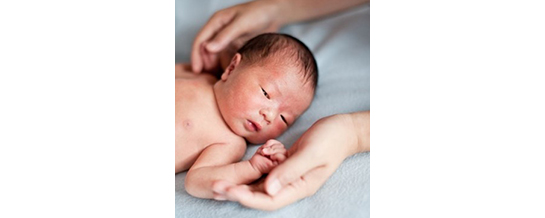Glucose 6 Phosphate Dehydrogenase (G6PD) deficiency
Congratulations on the birth of your baby!

All babies in Qatar are tested for a condition called Glucose 6 Phosphate Dehydrogenase (G6PD) deficiency by taking blood from the umbilical cord after delivery. Your baby has been found to have Glucose 6 Phosphate Dehydrogenase deficiency.
What is G6PD?
Glucose-6-Phosphate Dehydrogenase (G6PD) is an enzyme which protects the red blood cells and prevents them from being damaged. Red blood cells carry oxygen around the body to help make energy.
What is G6PD deficiency?
It is an inherited, lifelong condition of the red blood cells. It is more common in males than in females. G6PD deficiency will not affect the normal development and health of your baby if certain medicines, foods and substances are avoided. Apart from avoiding these substances the G6PD deficiency does not cause other troubles and does not need any treatment.
How did my baby get G6PD deficiency?
G6PD deficiency is inherited and is passed on down in genes from one or both parents. The gene responsible for this condition is X chromosome. G6PD deficiency cannot be prevented
Why G6PD deficiency is more common in males than in females?
Since males only have one X chromosome, if that X chromosome is received from a mother and contains the mutated gene, it will express itself and the individuals will become G6PD deficient. Females become a carrier if only one X chromosome is mutated. This explains why G6PD deficiency is more common in males than in females.
Who gets it?
It is most often found in children from families of Middle Eastern, Mediterranean or South East Asian origin.
What happens if my child is exposed to certain foods, medicines, or substance that should be avoided?
If your child is exposed to certain foods, medicines or substances or suffers from severe infection, large amount of red blood cells will be damaged and broken down (haemolysis crisis). The quick break down of red blood cells causes jaundice (high amounts of bilirubin) and anaemia (reduced number of red blood cells) which can range from being mild to life threatening.
- Jaundice in babies with G6PD deficiency
Jaundice is very common in all newborn babies but can be very dangerous in babies with G6PD deficiency. Jaundice is seen as a yellow coloration of the sclera (whites of the eyes) and skin. The urine may also appear very dark.
Without timely treatment in newborn babies with severe jaundice, high amounts of bilirubin in the blood may build up in the brain, leading to irreversible brain damage. Your baby will be monitored for jaundice whilst in hospital.
- Anemia in babies with G6PD deficiency
Anemia also results from a hemolytic crisis as the red blood cells are broken down leading to a reduced ability for your baby’s blood to carry oxygen around the body. Babies with anemia will look pale, they may be tired & breathless with a fast heart rate as they try to compensate for having less red blood cells to carry the oxygen needed to produce the body’s energy. Babies may need medicine or rarely blood transfusion to treat anemia.
List of foods and medicines to be avoided in individuals with G6PD deficiency:
This list is not comprehensive. If you have any concerns please talk to your doctor. Some individuals will react differently to others. If you are unsure avoid if possible!
-
Foods
Fava beans- also known as broad beans (all foods containing them). For example ful medammes, dips and spreads, legumes, blueberries, soya products, tonic water -
Miscellaneous
Avoid contact with henna in tattoos or hair dye
Avoid naphtha in mothballs & methylene blue dye. -
Medicines
Analgesics: high doses of aspirin, lidocaine, bupivacaine, prilocaine
Anti-arrythmics: procainamide, quinidine
Antibiotics: sulphonamides, co-trimoxazole, dapsone, chloramphenicol, nitrofurantoin, nalidixic acid, ciprofloxacin
Anti-cancer drugs: doxorubicin
Antihypertensives: methyldopa, hydralazine,
Antimalarials: chloroquine, hydroxychloroquine, primaquine, quinine, mepacrine
Diabetics- Hypoglycaemic drugs: glipizide, glicazide
Glaucoma medications: dorzolamide, acetazolamide (also used to treat & prevent acute mountain sickness)
Note: Normal doses of paracetamol or ibuprofen are safe in most babies with G6PD deficiency -
Vitamins
Large doses of vitamin C, vitamin K (a different preparation to the one given to your baby at birth)
General advice:
- If you are breastfeeding, you should avoid certain foods and medicines as these may be passed through the breast milk & cause a hemolytic crisis in your baby.
- Let any healthcare provider know your baby has G6PD deficiency before giving them or you any medicine.
- Inform anyone else who cares for your baby, for example family members, nannies or kindergartens that your baby is G6PD deficient and provide them with a list of things to avoid
- If you are worried about your baby, seek help immediately & let your healthcare provider know your baby has G6PD deficiency.
Additional resources:
There are excellent resources available at the G6PD Deficiency Association website www.g6pd.org

